Today we reminisce about
Spring Fever (1927)
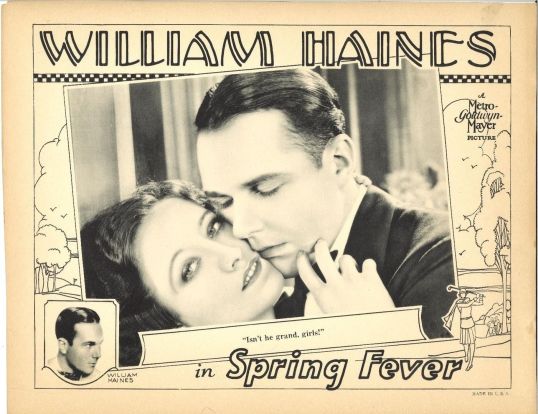
Directed by Edward Sedgewick
Starring: William Haines, Joan Crawford, George Fawcett
* Published specifically for the Joan Crawford: Queen of the Silver Screen Blogathon hosted by myself and Gabriela at Pale Writer *
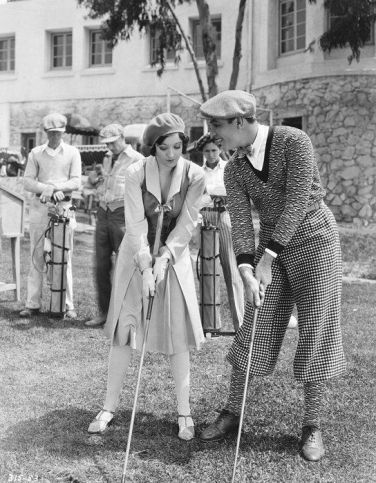
“Golf was invented by the Dutch in an effort to make the Scotch forget bagpipes. But today we find the American – first in war, first in peace and first on the course in the morning.”
Premise
Spring is the ideal time to play golf, a sport that is a vital necessity in life to many though mastered by a select few. Those who happily head off to the golf course with the aspiration of spending their existence in grassy bliss are referred to as “golf bugs”. Mr. Waters (George Fawcett) is the perfect example of this type of person. He regularly neglects his responsibilities as head of Northwestern Shipping Co. to improve his game, even going so far as to install a practice terrain in his home study. His efforts have not been in vain because he has earned a trophy though he still wishes to be better. Lately it seems as though he has completely lost his touch, however. Frustrated by this downturn, Waters returns to work with the demeanour of a hostile guard dog.
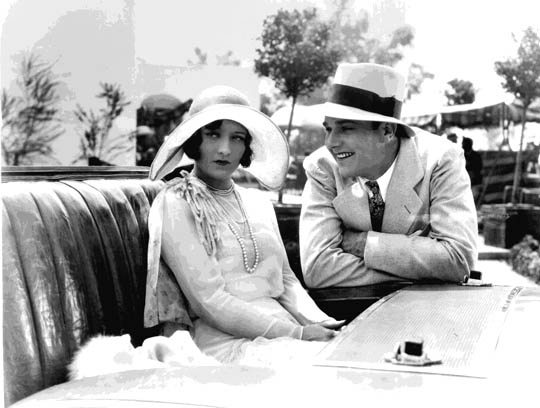
Another “bug” is Jack Kelly (William Haines), a lovely young man who spends most of time frequenting golf courses. His talent is so pronounced that he could easily be mistaken for a professional golfer. The thing is that Jack is not free to do as he pleases. In fact, he works as a shipping clerk for none other than Mr. Waters. Per usual, Jack strolls into work at his leisure and has his arrival time conveniently changed by an adoring secretary to make it appear as if he always arrives on time. Things are going pretty well for him until one morning when he finds the boss waiting for him. On that particular morning, Waters is extremely ornery and unforgiving. He takes to mercilessly firing Jack’s father Pop (who happens to work under his son’s authority) for breaking an object. Jack, who thinks that Waters is being too harsh, takes a piece of wood and uses it to hit a golf ball through a window. Fearing that he too has lost his job, Jack prepares to leave when Waters makes a complimentary remark about his swinging skills. It does not take long for the two to find a common ground speaking about their favourite pastime, saving both Jack and Pop’s jobs in the process.
Jack teaches Waters some of his golf moves and secrets that day and the next. To his surprise, Waters rewards Jack with a gift: a two week holiday at Oakmont Country Club where he will train for the club’s championship. He takes the opportunity to buy a whole new wardrobe to find it with the upper-crust crowd. This is a complete change from his humble origins as the son of a lower-class, widower manual labourer. Despite his father having reservations about Jack being with people so different from him, he is genuinely happy for his son and looks forward to him returning home.
Oakmont Country Club: “A castle of leisure designed to keep the idle rich busy.”
Transported in Waters’ personal car, Jack is all smiles when he arrives at the Club. As he goes to check-in, he notices a beautiful girl standing in line in front of him. Wanting to introduce himself, he makes note of her name and pretends that they have already met before. Allie Monte (Joan Crawford) is no fool, however, and quickly uncovers his scheme before storming off in disgust. They later meet on the golf course where Allie slowly warms up to Jack after he helps her with her posture and swing, infuriating Allie’s long-time admirer and current Club champion Harry Johnson. Even though Allie remains rather cool towards Jack, he is completely head over heels in love with her and is not afraid to show his affection. Over the next two weeks she becomes more accepting of a possible romance and publicly shows her complete faith in him. When Jack first arrived at the Club, he was sneered upon but he quickly impressed everyone by showing off his incredible golf skills. Having Allie’s support is the cherry on the top of the cake.
When the two weeks are up and the tournament winner has been determined, Jack has a hard time leaving the Club. Pop comes to take him home but Jack is embarrassed by his presence, taking him into a side room out of sight so that they can speak together. Jack states that he has decided to stay at the Club indefinitely and marry for money so that he can always remain in the upper class crowd. This comes as a shock to Pop as well as to Waters who threatens to expose Jack for the penniless pauper he really is. What Waters does not realize is that he, too, will be in the wrong as he has been passing Jack off as his nephew for weeks in order to gain him entry into the Club. The two elder men have no choice but to stay quiet. Conveniently enough, Allie comes from an extremely wealthy family so Jack is pleased to know that he can marry her and become rich all the while harbouring genuine sentiments. The thing is that Allie’s father has recently come into some bad luck and is now broke, leaving Allie with the predicament of having to marry for money in order to conserve her lifestyle. She agrees to wed Harry although her heart is not in it but breaks things off and runs away with Jack when he tells her that he is a millionaire. And so they get hitched with Allie thinking she has secured her future and Jack wondering how long he can keep up the farce.
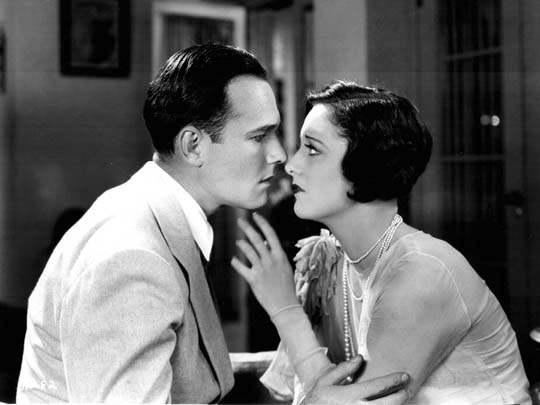
Background & Thoughts
The story is based on screenwriter/author Vincent Lawrence’s 1925 play, also titled Spring Fever, which ran on Broadway for 56 performances from 3 August 1925 until September. Lawrence was already well-known in the theatre world and would continue to write plays but would largely transition to working in motion pictures in the early 1930s. He found great success there penning films like Cecil B. DeMille’s Cleopatra, Victor Fleming’s Test Pilot, Walter Lang’s Moon over Miami and Raoul Walsh’s Gentleman Jim. After the introduction of sound, MGM decided to remake Spring Fever into a musical comedy under the name Love in the Rough, a 1930 feature starring Robert Montgomery. The remake was poorly received with the 1927 version being considered superior in terms of dialogue and cinematography.
At first glance, one might think that this is simply a film about sports with no particular meaning or morale significance. While this is partially true, there is an underlying theme of acceptance and redemption that can still have a strong meaning in today’s world. Social classes have always existed and likely always will, so stories about a person coming from the wrong side of the tracks into a more privileged bracket garner interest. What I like about Spring Fever is the realism of Jack’s seduction into high society as it happens ever so slightly that you do not even notice it. When he rejects his father for being poorly dressed and socially awkward, you as the audience are as shocked as Pop. Suddenly, you no longer recognise this sweet young man who has turned into a snobbish brute. Such a radical change in behaviour does not happen overnight, even with all of the money and resources at your fingers. If it did, shows like The Beverly Hillbillies would have instantly failed. It is a lucky thing that Jack’s true nature eventually shines through, allowing him to remember his humble origins and think with his heart, even if his rationale is not exactly correct!
You can really see that Jack and his father have a strong bond and that Pop passed down a good education to his son all the while providing him with what he could. One thing I noticed in the Kelly house was that Pop was cooking some sort of meat for dinner. The cost of meat in the period post-World War I and pre-Great Depression was surprisingly reasonable but still a struggle for families with few means. Jack and Pop may have made out alright because they had their combined salaries but they were by no means even lower middle class. The fact that Pop made a good home for his son and that he cares so much about him is very touching. Likewise, it is lovely to see Jack help his father out with carrying heavy boxes at work.
This is an uplifting film that is entertaining but also meaningful. If anything, it is bound to put a smile on your face. 🙂
Joan Crawford
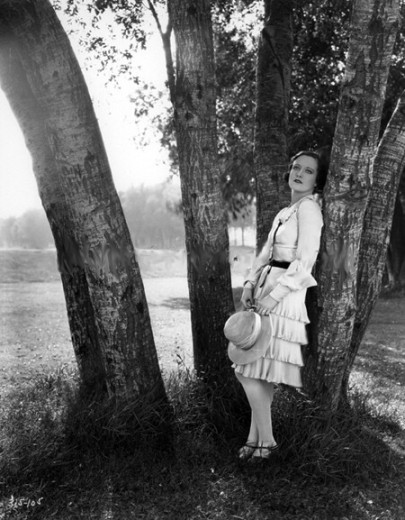
Joan’s screen career officially began in 1925 even though her first role gave her no lines of dialogue or even the chance to show her face. She worked as a body double for Norma Shearer in the silent film Lady of the Night in which Norma played dual characters. The next couple of years would be very busy for Joan however, as she appeared in no less than twenty other pictures (in both credited and non-credited roles) before Spring Fever was released. One of those films was The Unknown, a vehicle that would finally bring her recognition and a leap towards stardom. Not only that, the film also provided Joan with a great opportunity to learn the ropes of the movie business playing opposite one of the silent era’s most famous and influential actors, Lon Chaney. According to Joan:
“The Unknown was a good film—and working with Lon Chaney was both traumatic and delightful. He demanded so much from me. I was scared, but I seemed to do it right.”*
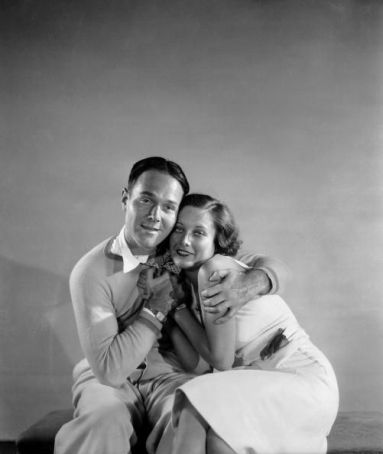
Released five months after The Unknown, Spring Fever was Joan’s third collaboration with leading man William Haines. They had previously both appeared in A Slave of Fashion and co-starred in Sally, Irene and Mary, both released in 1925. Joan and William got along very well and became very close friends off-screen with her providing him moral support when he was fired from MGM for refusing to enter an arraigned marriage to conceal his homosexuality. (On a side note, I came across this brilliant suggestion to turn Haines’ story into a film.) Audiences seemed to revel in their pairing and the success of Spring Fever helped make their popularity soar. Later in life, Joan was not too optimistic in her recollections of the film, stating: “Spring Fever was a waste of everyone’s time and money. God, golf is dull on film.” Although this sounds terrible, Joan was prone to being very hard on herself and by all means, she was her worst critic. She often uses words like miscast, awful, disaster, lousy, forgettable, and so on to describe her performances and work. I happen to see her in a different light and think she was a great talent in every single one of her films. Call me biased.
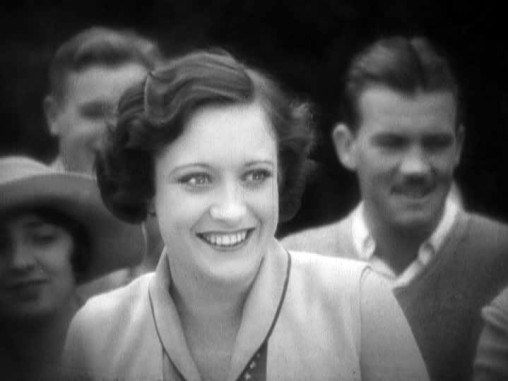
In reading different reviews/takes on Spring Fever, I noted that a lot of people considered Joan’s role to require only a “gypsy rehearsal performance”. They compliment her beauty but do not give her any credit other than that. To me, it does not seem as if Joan has a supporting role because I see her as Jack’s spiritual equal. I judge her portrayal of the character rather than the length of her screen time. Joan brings a lot of personality to Allie, showing a colourful temperament and certain maturity all the while conserving the freshness of youth. It is charming to see Jack and Allie’s romance play out as they are both relatively inexperienced yet quite sure of what they want. Although I have long been an “old” married lady, I will not soon forget how I felt in those beginning stages of courtship. I also appreciated the lack of pretentiousness in Allie’s attitude because she did not turn up her nose just because she was upper crust, largely keeping a low profile which was undeterred by having a taste for the finer things in life and being a “golf bug” dreamer. A lot of emotion is communicated through Joan’s expressions, particularly in her bigger than life, gorgeous eyes. It is easy to see why she became a favourite in silent pictures and was able to build an extraordinary career that lasted until 1970.
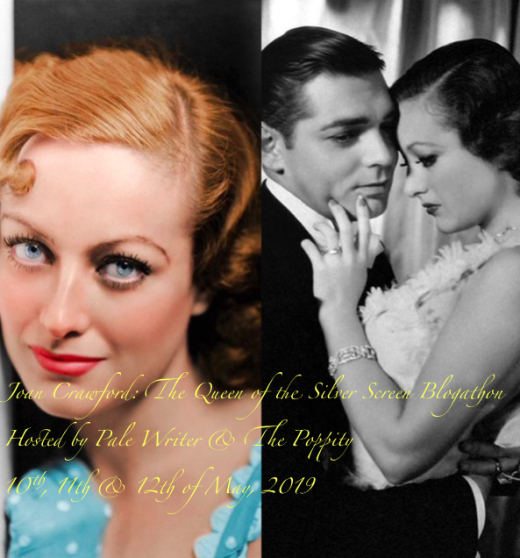
*Conversations with Joan Crawford as told to her friend and confidante Roy Newquist, page 70








I saw the remake first and was not impressed. I’m happy to say that I found Spring Fever a bit of all right. I particularly like how you found Jack and Allie to be “spiritual equals.” I think that is what makes this the superior movie of the two.
LikeLiked by 1 person
I wonder how Montgomery felt about being cast in a lacklustre remake, especially since he was a very valuable asset at MGM. It’s also quite ironic that he and Joan would star in quite a few pictures together!
‘Spring Fever’ proved to be quite a fun movie but also one that tugged at your heart. The title is truly befitting of the youthful characters and their passion for life. William and Joan were really lovely to watch together. I can only dream that they went on to have a very happy life together. 😀
LikeLike
Funny how golf was a kind of sub-topic for films of that era (1930’s Follow Thru is my fave). It’s so interesting to watch Joan in these early roles – she’s almost there, but not quite. Yet, there is just something about her. You knew this girl was going to go far and, boy, did she! Lovely post (and so nice to see her with her pal William Haines) and many thanks for co-hosting the blogathon.
LikeLiked by 1 person
It’s my pleasure, Marsha, and thank you for kind words. 😊
Have you seen ‘West Point’, an equally charming story with William and Joan? He is even more handsome in that and really makes me wish that he had been able to continue his film career. You are so right about Joan because she is still very new in this film but affirms herself so well. She was made to be in front of the camera, no doubt. I wish that more of her surviving silent films would be released. 🙂
LikeLike
I really want to see this! I really enjoyed reading your thoughts. How lovely that Joan stuck by William Haines too.
LikeLiked by 1 person
Thank you, Maddy! 😁 I think you’d love this. The nitrate print is terribly damaged in some parts but it’s not a hindrance to watching the film. Joan and William were a delightful couple to watch together because their fondness for each other is underlying apparent. 😊
LikeLike
I loved your review. It sounds like this film has charm and a good message, which is the type of film I like.
Thanks for including the story re: Joan’s friendship with William Haines. I didn’t realize (A) they did three films together and (B) she remained his steadfast friend. Thanks to your blogathon, a person uncovers more and more gems about our fab Joan.
LikeLiked by 1 person
Your kind words are much appreciated, Ruth! 😀
This is a very nice film and you really do not feel as if you are watching a film without audible dialogue. The music composed for it is just perfect as well. I only wish that I could have found higher quality photos with the other cast members though I was actually surprised to find as many as I did!
You are very welcome for having talked about William and Joan’s friendship! It is actually largely thanks to her that William was able to branch out to interior design after retiring from films. He was very successful in that field and ultimately, he probably had more happiness doing what he loved than if he had continued his film career, especially under such difficult circumstances.
Again, thank you for having participated and for getting this blogathon rolling! I’ve been a huge fan of Joan’s for years and I still learn new tidbits about her, too. 🙂
LikeLiked by 1 person
Oh my golly gosh I LOVE this review. I have not seen this film, nor any of the others she made with her chum, but I really want to it now. Joan just looks so sweet and beautiful, and my brother is a golf enthusiast of note, so I think I’ll be able to relate to the storyline in some way. Fabulous read as always, my friend 💖
LikeLiked by 1 person
That’s so, so kind of you, my dear! 😀 I think that you would just absolutely adore this film because it’s generally very upbeat and endearing. You would just love how expressive Joan was in these silent films. The films she did with William were really nice and I would love to see other features with him as well. I think the most startling silent I have seen from her is ‘Across to Singapore’, which is probably the “raciest” of the lot. ‘Spring Fever’ and ‘West Point’ is really an excellent double feature and I hope that you get the chance to see both of them sometime soon in the future!
LikeLiked by 1 person
I will make a point of seeing all of those! 😁
LikeLiked by 1 person
I’m ashamed to say I haven’t seen many of Joan Crawford’s silent films and this is one of them. I am very interested in seeing her paired with William Haines and your review has prompted me to finally see it, so I need to track down a copy. Thanks for a fantastic and fascinating review!
LikeLiked by 1 person
Thank you so much, Ruth!
It actually took me quite a while to get around to seeing Joan’s silent films so you should not feel bad in any sense. I’ve been collecting all of her films over the years and took the plunge when I had the means. (The Warner Archive Collection is amazing but sometimes the prices are just unbelievably steep.)
I really enjoyed Joan’s pairings with William Haines and highly recommend that you watch ‘Spring Fever’ along with ‘West Point’. They were indeed lovely together! Joan actually has quite a few surviving silent films out there and not too many of them had made it onto DVD. ‘Spring Fever’ and the others have sadly not been restored, which means that the others out there are possibly in worse shape than these. Nonetheless, these films are as enjoyable as any of her sound features. I hope that you’ll get to see this film and her others in the near future!
LikeLike
Another one to add to my list!
LikeLiked by 1 person
😄 I don’t know about you but my list seems never-ending! It’s a lot of fun to discover new titles, though. If only there was more time in the day solely for movie watching. 😃
LikeLiked by 1 person